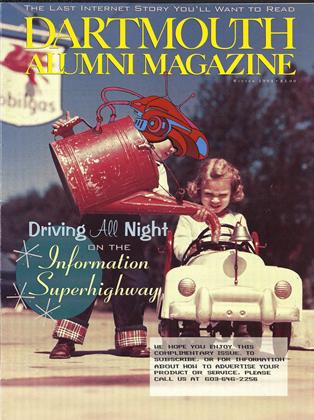At the Board of Trustees' annual retreat in August, I spoke about one special concern that encompasses all the others that Dartmouth faces as an institution: maintaining and enhancing its academic stature.
When I applied to college 40 years ago, Dartmouth competed for students principally with a relatively small number of institutions with the Ivy League universities and a few New England colleges. Today all of that has changed. We find ourselves in a national competition with a far greater number of colleges and universities for students and faculty of the very same high quality.
We still compete with the universities of the Ivy League and with a number of distinguished colleges, just as we did 40 years ago. But when the most talented high-school seniors across the country consider highly selective colleges and universities today, they include within that group a number of schools that were not widely considered in the highest echelon in the 19505.
We now compete for faculty and students widi a number of great private universities including Duke and Stanford that have grown to maturity in the last 35 years, and with great public universities like the Universities of California at Berkeley and Los Angeles, the University of Texas, the University of Michigan, the University of Virginia, and the University of North Carolina that have moved into the top tier of academic quality during that same period.
Conversely, several institutions that were considered in the very highest tier when I applied to college are not generally ranked that high today. They have gradually slipped in quality. As some stars have waxed, others have waned.
It is the excellence of the educational opportunity that an institution provides its students that makes the difference.
What does that mean? Permit me to mention four aspects of Dartmouth related to educational excellence.
First, we have adopted a new curriculum with an increased emphasis on science and technology. Moreover, we have established the Women in Science Project, designed to encourage more of our women students to continue to pursue their interest in majoring in science, and, in due course, to consider careers in the sciences.
Second, we continue to emphasize freshman seminars as part of our effort to teach students to write clearly and effectively. The seminars are intended to hone the skills of composition that are so essential to an excellent liberal education.
Third, international education and instruction in foreign languages is an important part of Dartmouth's excellence. Within the last several years, we have introduced into the curriculum three new foreign languages: Hebrew, Arabic, and Japanese. We maintain foreign study programs that send our students to approximately 40 different sites around the world.
Fourth, we have established the Presidential Scholars Program and similar opportunities throughout the curriculum that enable our students to work one-on-one with faculty members on a manuscript, in a laboratory, or on field work. The maintenance of such intimate opportunities for individualized learning affords Dartmouth an opportunity to distinguish itself from some of its larger peer institutions.
These are just four of many ways in whicH Dartmouth continues to pursue academic excellence, to stretch its students' minds to the fullest as it must do if it is to continue to enjoy its current eminence in the years ahead.
As a general rule, the members of our Board of Trustees serve for two five-year terms, one decade. During the course of a decade during the watch of a trustee or the administration of a president colleges and universities can rise in stature and eminence, or they can slip. The possibility of Dartmouth's slipping is unthinkable.
And so, my overarching concern as president of Dartmouth, as I told the Trustees indeed, it is the largest concern of any president of a college or a university is to insure that on my watch and on their watch we succeed not only in maintaining Dartmouth's enviable academic stature, but in enhancing it. Our future depends upon it.
Dartmouth's staturedepends onmaintaining andenhancing academicexcellence.
 View Full Issue
View Full Issue
More From This Issue
-
 Cover Story
Cover StoryA Night Out on the Net
December 1994 By Jay Heinrichs -
 Feature
FeatureWhat We Do Best
December 1994 -
 Feature
FeatureAnti-Social Climbers
December 1994 By Tyler Stableford '96 -
 Article
ArticleDr. Wheelock's Journal
December 1994 By E. Wheelock -
 Article
ArticleTied Up with Strings
December 1994 By Karen Endicott -
 Class Notes
Class Notes1957
December 1994 By Richard F. Perkins








